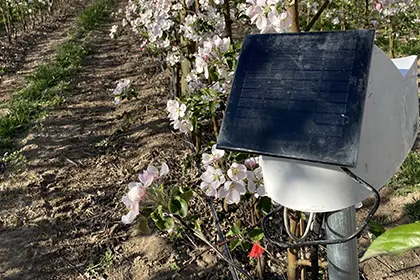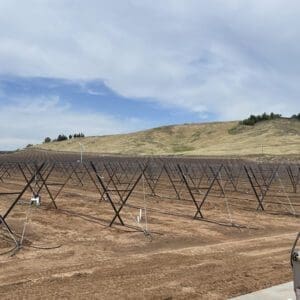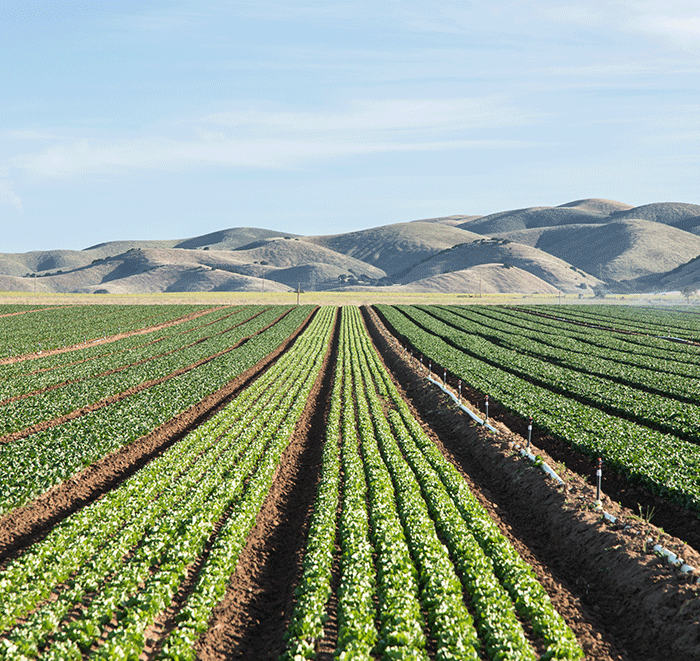
Focus on efficient water management
June 02, 2022
Water is the obvious input growers need to maximize crop production every year. For growers in the West, where water scarcity has become all too common, water management has become even more critical. By employing several strategies, growers can prepare for too-dry conditions.
 “The western United States remains in a severe drought,” said Wilbur-Ellis Agribusiness Western South Director of Sales Willie Negroni, who works across California, Arizona, New Mexico and southern Colorado.
“Access to surface water has been reduced in all water districts, some down to zero. Groundwater is pressured because aquifers cannot recharge. There has been a larger draw on this due to reduction in surface water,” he added.
Negroni said little rainfall and below-average snowpack means growers will continue to be affected, from California rice and nut crops to high-end grapes to row and forage crops.
“Growers need to use today’s technologies that measure water availability in the root zone, followed by drip/micro emitter applications to precisely deliver water to crops. Cultural practices, that vary by crop and region, can also be adapted to reduce water consumption,” said Negroni.
Growers can partner with Wilbur-Ellis to use these tools to trigger irrigation events for the exact quantities of water needed. Soil probes can be placed across fields to measure how much water is available to the crop root zone prior to application. And pressure bomb testing at the tree level can provide an understanding of the amount of water stored in trees before irrigation.
Customers have access to Probe Schedule, one of the most technologically innovative irrigation water management systems in the world, that can improve productivity and help add value to their operations. Its irrigation water management software receives and collects data from in-field hardware devices and weather stations to calculate accurate crop water usage and soil moisture, providing growers with specialized irrigation schedules.
“The western United States remains in a severe drought,” said Wilbur-Ellis Agribusiness Western South Director of Sales Willie Negroni, who works across California, Arizona, New Mexico and southern Colorado.
“Access to surface water has been reduced in all water districts, some down to zero. Groundwater is pressured because aquifers cannot recharge. There has been a larger draw on this due to reduction in surface water,” he added.
Negroni said little rainfall and below-average snowpack means growers will continue to be affected, from California rice and nut crops to high-end grapes to row and forage crops.
“Growers need to use today’s technologies that measure water availability in the root zone, followed by drip/micro emitter applications to precisely deliver water to crops. Cultural practices, that vary by crop and region, can also be adapted to reduce water consumption,” said Negroni.
Growers can partner with Wilbur-Ellis to use these tools to trigger irrigation events for the exact quantities of water needed. Soil probes can be placed across fields to measure how much water is available to the crop root zone prior to application. And pressure bomb testing at the tree level can provide an understanding of the amount of water stored in trees before irrigation.
Customers have access to Probe Schedule, one of the most technologically innovative irrigation water management systems in the world, that can improve productivity and help add value to their operations. Its irrigation water management software receives and collects data from in-field hardware devices and weather stations to calculate accurate crop water usage and soil moisture, providing growers with specialized irrigation schedules.
 “Successful water management with Probe Schedule triggers irrigation to deliver a precise amount of water only to the root zone so you don’t irrigate a whole field,” he said. “We talk to customers about installing these soil probes and measuring water availability before application. We also advise customers on water quality. Surface water is best because groundwater contains a lot of minerals. By measuring water quality, we can help growers decrease that mineralization.”
Negroni said Wilbur-Ellis can offer advice about these and other potential water management needs before growers purchase new land or expand their operations, to determine if the right technology is present or if additional technology is needed for specific, planned crop production.
“Successful water management with Probe Schedule triggers irrigation to deliver a precise amount of water only to the root zone so you don’t irrigate a whole field,” he said. “We talk to customers about installing these soil probes and measuring water availability before application. We also advise customers on water quality. Surface water is best because groundwater contains a lot of minerals. By measuring water quality, we can help growers decrease that mineralization.”
Negroni said Wilbur-Ellis can offer advice about these and other potential water management needs before growers purchase new land or expand their operations, to determine if the right technology is present or if additional technology is needed for specific, planned crop production.
 “The western United States remains in a severe drought,” said Wilbur-Ellis Agribusiness Western South Director of Sales Willie Negroni, who works across California, Arizona, New Mexico and southern Colorado.
“Access to surface water has been reduced in all water districts, some down to zero. Groundwater is pressured because aquifers cannot recharge. There has been a larger draw on this due to reduction in surface water,” he added.
Negroni said little rainfall and below-average snowpack means growers will continue to be affected, from California rice and nut crops to high-end grapes to row and forage crops.
“Growers need to use today’s technologies that measure water availability in the root zone, followed by drip/micro emitter applications to precisely deliver water to crops. Cultural practices, that vary by crop and region, can also be adapted to reduce water consumption,” said Negroni.
Growers can partner with Wilbur-Ellis to use these tools to trigger irrigation events for the exact quantities of water needed. Soil probes can be placed across fields to measure how much water is available to the crop root zone prior to application. And pressure bomb testing at the tree level can provide an understanding of the amount of water stored in trees before irrigation.
Customers have access to Probe Schedule, one of the most technologically innovative irrigation water management systems in the world, that can improve productivity and help add value to their operations. Its irrigation water management software receives and collects data from in-field hardware devices and weather stations to calculate accurate crop water usage and soil moisture, providing growers with specialized irrigation schedules.
“The western United States remains in a severe drought,” said Wilbur-Ellis Agribusiness Western South Director of Sales Willie Negroni, who works across California, Arizona, New Mexico and southern Colorado.
“Access to surface water has been reduced in all water districts, some down to zero. Groundwater is pressured because aquifers cannot recharge. There has been a larger draw on this due to reduction in surface water,” he added.
Negroni said little rainfall and below-average snowpack means growers will continue to be affected, from California rice and nut crops to high-end grapes to row and forage crops.
“Growers need to use today’s technologies that measure water availability in the root zone, followed by drip/micro emitter applications to precisely deliver water to crops. Cultural practices, that vary by crop and region, can also be adapted to reduce water consumption,” said Negroni.
Growers can partner with Wilbur-Ellis to use these tools to trigger irrigation events for the exact quantities of water needed. Soil probes can be placed across fields to measure how much water is available to the crop root zone prior to application. And pressure bomb testing at the tree level can provide an understanding of the amount of water stored in trees before irrigation.
Customers have access to Probe Schedule, one of the most technologically innovative irrigation water management systems in the world, that can improve productivity and help add value to their operations. Its irrigation water management software receives and collects data from in-field hardware devices and weather stations to calculate accurate crop water usage and soil moisture, providing growers with specialized irrigation schedules.
 “Successful water management with Probe Schedule triggers irrigation to deliver a precise amount of water only to the root zone so you don’t irrigate a whole field,” he said. “We talk to customers about installing these soil probes and measuring water availability before application. We also advise customers on water quality. Surface water is best because groundwater contains a lot of minerals. By measuring water quality, we can help growers decrease that mineralization.”
Negroni said Wilbur-Ellis can offer advice about these and other potential water management needs before growers purchase new land or expand their operations, to determine if the right technology is present or if additional technology is needed for specific, planned crop production.
“Successful water management with Probe Schedule triggers irrigation to deliver a precise amount of water only to the root zone so you don’t irrigate a whole field,” he said. “We talk to customers about installing these soil probes and measuring water availability before application. We also advise customers on water quality. Surface water is best because groundwater contains a lot of minerals. By measuring water quality, we can help growers decrease that mineralization.”
Negroni said Wilbur-Ellis can offer advice about these and other potential water management needs before growers purchase new land or expand their operations, to determine if the right technology is present or if additional technology is needed for specific, planned crop production.
